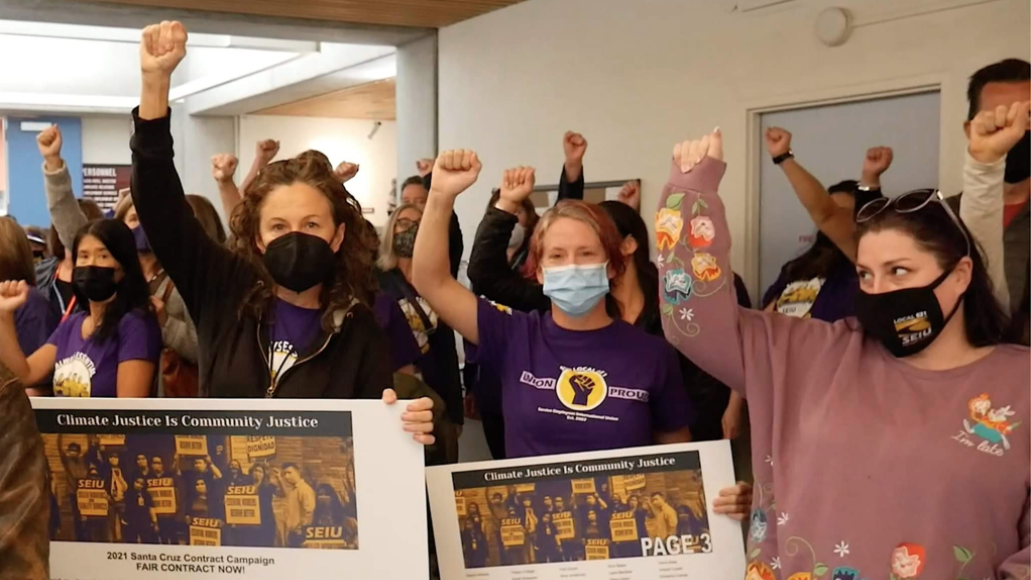SANTA CRUZ—More than 100 County of Santa Cruz workers filled the County Supervisors chambers during the board’s bi-monthly meeting on Tuesday, where many of them demanded pay increases and other requests to highlight ongoing contract negotiations between their union and the County.
The workers, members of Service Employees International Union chapter 521 (SEIU), are also asking the County to make Juneteenth a paid holiday. The federal holiday commemorates June 19, 1865, the day that Black slaves were emancipated in the U.S.
County spokesman Jason Hoppin says that the County already offers its employees 13 paid holidays a year, which amounts to nearly three weeks. In addition, the County added Christmas Eve as a paid holiday, he says.
“Just 9 percent of employers offer Juneteenth as a paid holiday,” Hoppin said.
In addition, SEIU is asking for more employees to be able to telecommute, which union representatives say is a way to support climate action and reduce greenhouse gas emissions.
During the meeting, SEIU 521 President Veronica Velasquez said that union members are ready to strike if their demands are not met.
Velasquez said that County workers have not seen a pay increase since 2019, a fact that is particularly irksome after they worked through the Covid-19 pandemic and the CZU Lightning Complex fires.
“Negotiations are going nowhere,” Velasquez said. “Employees are fed up, burned out and disrespected.”
Katie Williams, a public health nurse with the County’s communicable disease unit, agreed.
“We’re doing a lot more work with a lot less time and fewer people,” she said.
Alma Ruiz, a child support specialist for the Department of Child Support Services, says that offers from the union have garnered unacceptable responses from the County. County workers last year took a 7.5% pay cut, which she says amounts to 156 hours.
“Every economic proposal we placed on the table, the response has been a very insulting counter-offer,” she said.
Hoppin says that the union and County will meet again today for continued negotiations. Employees are working under a one-year “placeholder” contract during the aftermath of the CZU fires and the pandemic, he says.
SEIU members say that Latinx people are paid less than their white counterparts, an assertion Hoppin says is untrue.
“Pay and benefits are set by civil service rules and salary schedules negotiated among all labor groups,” he stated in an email. “The schedules are gender and color blind and largely set by seniority.”
Velasquez says that making climate change a part of contract negotiations could be an “unprecedented” move by a union.
“But we feel it is everybody’s responsibility to do something about climate change, and we can no longer delegate this to the experts and the federal government,” she said. “We need to take action.”
Ruiz says that allowing more employees to work from home—thus reducing greenhouse emissions and traffic—would align with a county pledge to be “carbon neutral” by 2030.
Hoppin says that the County has one of the most progressive telework policies of any local government in the region.
“We understand the desire to work from home and support it, but at some point, if you are going to serve the public you will need to interact with the public,” he said.
Williams stressed that many employees have been working with the public for the past two years marked by twin calamities.
“Nobody shirked their duty and said, ‘hey we can’t come in because we’re working from home today,’” she said.













